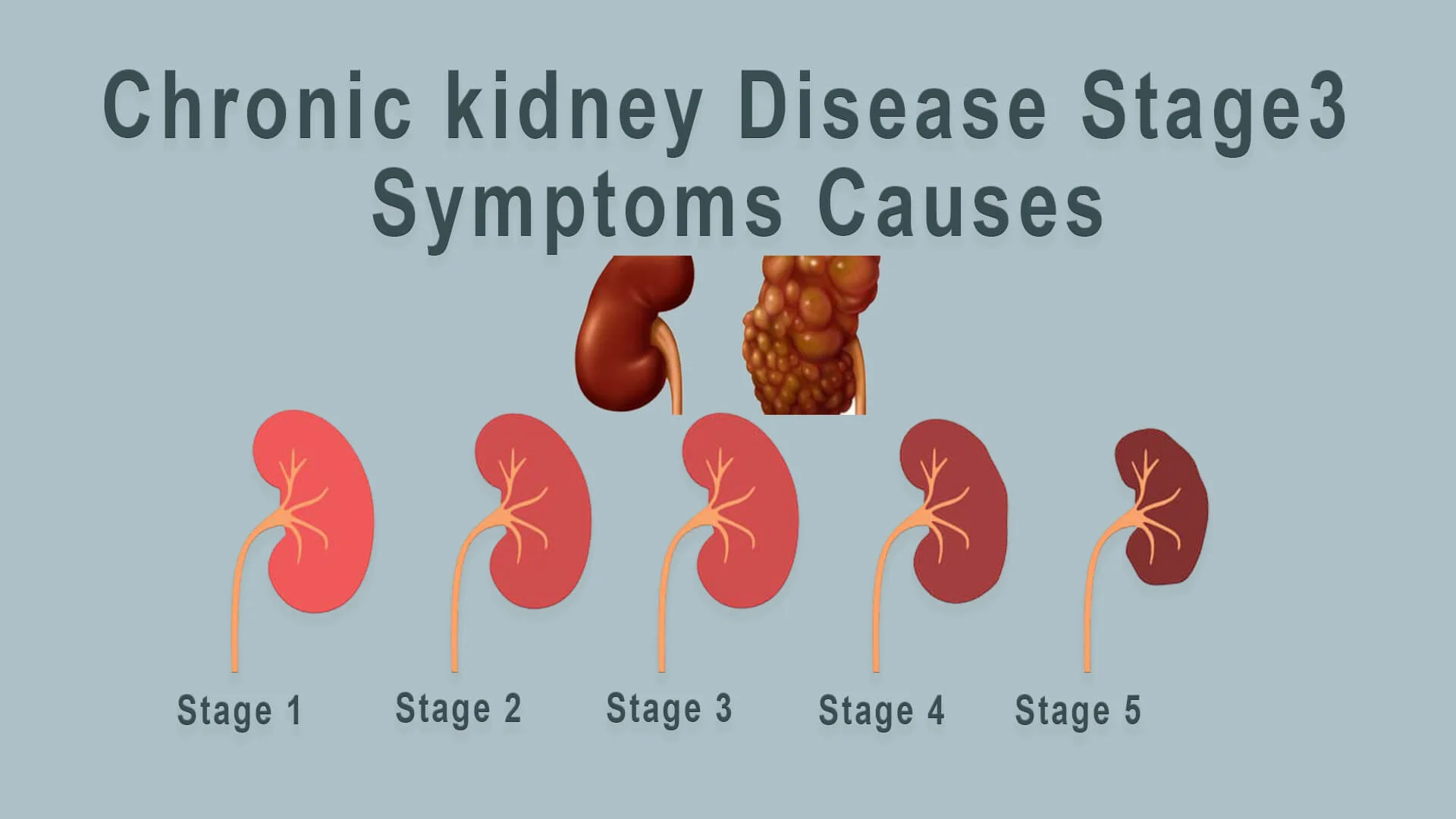What is stage 3 kidney disease?
At this stage of CKD, (stage 3b kidney disease) your kidneys have modest to severe impairment, making it more difficult for them to filter waste and fluid from your blood. Your body’s waste can build up and begin to harm other organs and systems, including your bones, high blood pressure, and anemia.
What is CKD, or chronic kidney disease?
Doctors refer to any abnormalities of the kidneys as having renal disease, even if there is just minor damage. Chronic refers to a condition that does not fully improve and how much stage 3 kidney disease life expectancy.
What is the creatinine level for stage 3 kidney disease?
Regardless of the presence or absence of hypertension, diabetes, or congestive heart failure, the ideal cutoff values for serum creatinine were 1.3 mg/dl for men and 1.0 mg/dl for women for the diagnosis of stage 3 CKD in older persons.
What is stage 1 of CKD?
The kidney damage is minimal in Stage 1 CKD. Despite any physical or visible damage to your kidneys, your kidneys are still functioning normally. If you have stage 1 CKD, you have normal urine protein levels but an estimated glomerular filtration rate (eGFR) of 90 or above.
What is CKD in Stage 3?
Your kidneys have mild to severe impairment at this stage of CKD, making it harder for them to filter waste and fluid from your blood. This waste can accumulate in your body and start to injure other parts, such as your bones, excessive blood pressure, and anaemia. In these condations patiants want to know how much stage 3 kidney failure life expectancy and they also want to know about that is kidney disease curable?
Is stage 3 of chronic renal disease bad?
Moderate chronic renal disease (chronic kidney disease stage 3) is described as stage 3. This indicates that you probably won’t need to consult a kidney specialist in many cases. But you will need to visit your doctor frequently for monitoring, which may involve blood and urine tests.
Stage 4 renal disease symptoms
What does kidney failure feel like?
Shortness of breath, edoema (swelling) of the extremities, and fluid retention Urination alterations (foamy; dark orange, brown, tea-colored or red if it contains blood; and urinating more or less than normal). Backache from kidney discomfort. Sleep issues are brought on by leg cramps or restless feet.
Signs of stage three CKD
Early stages of CKD Kidney disease are frequently only identified if a routine test, such as a blood or urine test, for another condition, detects a potential issue.
CKD’s later stages
If stage 3b chronic kidney disease are not detected early on or if it worsens despite treatment, a number of symptoms may appear.
Swollen ankles, feet, or hands from water retention can also be symptoms, as can appetite reduction and weight loss (Oedema).
Kidney disease stage 3 symptoms
- Excessive breathing
- Tiredness
- Blood in the urine (urine)
- An increased urge to urinate, especially at night
- Trouble sleeping (insomnia)
- Dry skin
- Muscle pain
- feeling unwell
- Headaches
- Male erectile dysfunction
- Stage 3 kidney failure
Stage 3 kidney disease symptoms (kidney failure stages):
Most people want to know what stage 3 kidney disease is
- Fatigue
- Fluid retention, edoema (swelling) of the extremities, and breathlessness:
- Urination adjustments (foamy; dark orange, brown, tea-colored or red if it contains blood; and urinating more or less than normal)
- Back pain from the kidneys
- Sleep issues brought on by cramping in the muscles or restless legs
Chronic Kidney Disease Stage 5
End-stage renal disease (ESRD) is defined as a glomerular filtration rate (GFR) of 15 ml/min or less in a patient with stage 5 chronic kidney disease.
Signs of CKD in stage 5
In stage 5 CKD, symptoms can include: • Appetite loss
- Vomiting or nauseous
- Headaches
Being exhausted
- Having trouble focusing
- Itching
- Producing minimal or no pee
- Swelling, particularly in the ankles and eyes
- Muscle pain
- Tingling in the feet or hands
- Variations in skin tone
- More pronounced skin pigmentation
Diabetic kidney disease stages
You have a probability of developing kidney disease stage 3 “diabetic renal disease” if you have diabetes and have kidney issues. Some individuals could refer to it as diabetic nephropathy. It occurs when your kidneys are harmed by high blood pressure many organs failure in ckd stage 3 or high blood sugar as a result of diabetes and cause of renal failure.
Stage 1
Your kidneys start to work a little harder than usual during this phase and may also enlarge a little. There is a small amount of protein in your urine.
The disease is in its early and mild stages at this point, as in:
- Maintain healthy blood pressure and blood sugar levels.
- Maintain a healthy diet that limits salt consumption.
- Remain active (30 minutes of exercise a day).
- Maintain an appropriate weight.
- Stop smoking if you do.
Stage 2
This stage gradually progresses over time. Your kidneys are still functioning rather well, but they may be damaged, as seen by the presence of more protein in the urine.
The same advice you attempted in stage 1 can help you maintain the health of your kidneys.
Stage 3
You won’t likely experience any symptoms at this point. However, some people may experience things like swelling in their hands or feet. Anaemia and high blood pressure may also begin to affect you.
Along with following the same precautions as in stage 1, it’s critical to seek treatment from a nephrologist, or a kidney specialist.
Stage 4
You must closely monitor this stage because it is a dangerous condition if you don’t want to develop kidney failure. Your hands and feet may expand, and your frequency of urination may fluctuate, as a result of your kidneys’ potential malfunction.
Additionally, you could have high levels of potassium blood acidity and phosphorus buildup.
Stage 5
You will require dialysis or a kidney transplant if your kidneys quit functioning. Dialysis is a procedure used to purify the blood and drain the body of fluid.
How do my kidneys become harmed by diabetes?
Blood vessels within the kidneys are one area where diabetes can damage them. There are numerous small blood veins inside the kidney’s filtering organs. These arteries may eventually contract and block as a result of elevated blood sugar levels.
- Your body’s nerves. Your body’s nerves can get damaged as a result of diabetes. Your bladder and all other areas of your body, including your brain, communicate with one another via nerves. When your bladder is full, they signal to your brain. However, if your bladder’s nerves are injured, you might not be able to feel when it’s full.
- Urinary system. You could get a urinary tract infection if pee sits in your bladder for an extended period of time. Bacteria are the cause of this. Similar to germs, bacteria are very little creatures that can spread illness. In urine with a high sugar level, they expand quickly.
Treatment for stage 3 kidney disease or (Stage 3 renal failure)
Although kidney illness cannot be treated, stage 3 suggests that there is still time to stop renal failure from progressing further.
Consider eating smaller, more frequent meals throughout the day if you’re losing your appetite to make sure you’re getting enough calories and nutrients.
Medical attention
In kidney disease chronic stage 3 Dialysis or a kidney transplant is not necessary treatments for stage 3 CKD. Instead, you will be given prescriptions for specific drugs to treat underlying illnesses that could be causing kidney damage.
For high blood pressure, these include ACE inhibitors and ARBs for angiotensin II receptor blockade and glucose control for diabetes.
In individuals with CKD stage 3 associated with type 2 diabetes, Kerendia (finerenone), a prescription drug, can lower the risk of end-stage kidney disease, cardiovascular death, nonfatal myocardial infarction, and hospitalisation for heart failure.
In chronic kidney disease stage 3b The following treatments for CKD side effects may also be recommended by your doctor: iron supplements for anaemia:
- Supplements with calcium and vitamin D to prevent bone fractures
- Medicines that reduce cholesterol
- Diuretics for edoema treatment
Having renal disease in stage 3 or what is stage 3 kidney disease
You can manage CKD stage 3 by making additional lifestyle changes, taking your prescribed medications as directed, and maintaining a healthy diet. You should speak with your doctor about the following:
- Aim for at least 30 minutes of moderate activity per day on most days of the week. With a doctor’s guidance, you can begin an exercise programme safely.
- Regulating blood pressure, High blood pressure can exacerbate CKD and act as a risk factor for the condition. Try to maintain a 140/90 blood pressure reading or less.
- Stress management. Some tactics include exercising, getting more sleep, and practising meditation.
- Giving up smoking. Consult your doctor for advice on the best ways to stop smoking.





